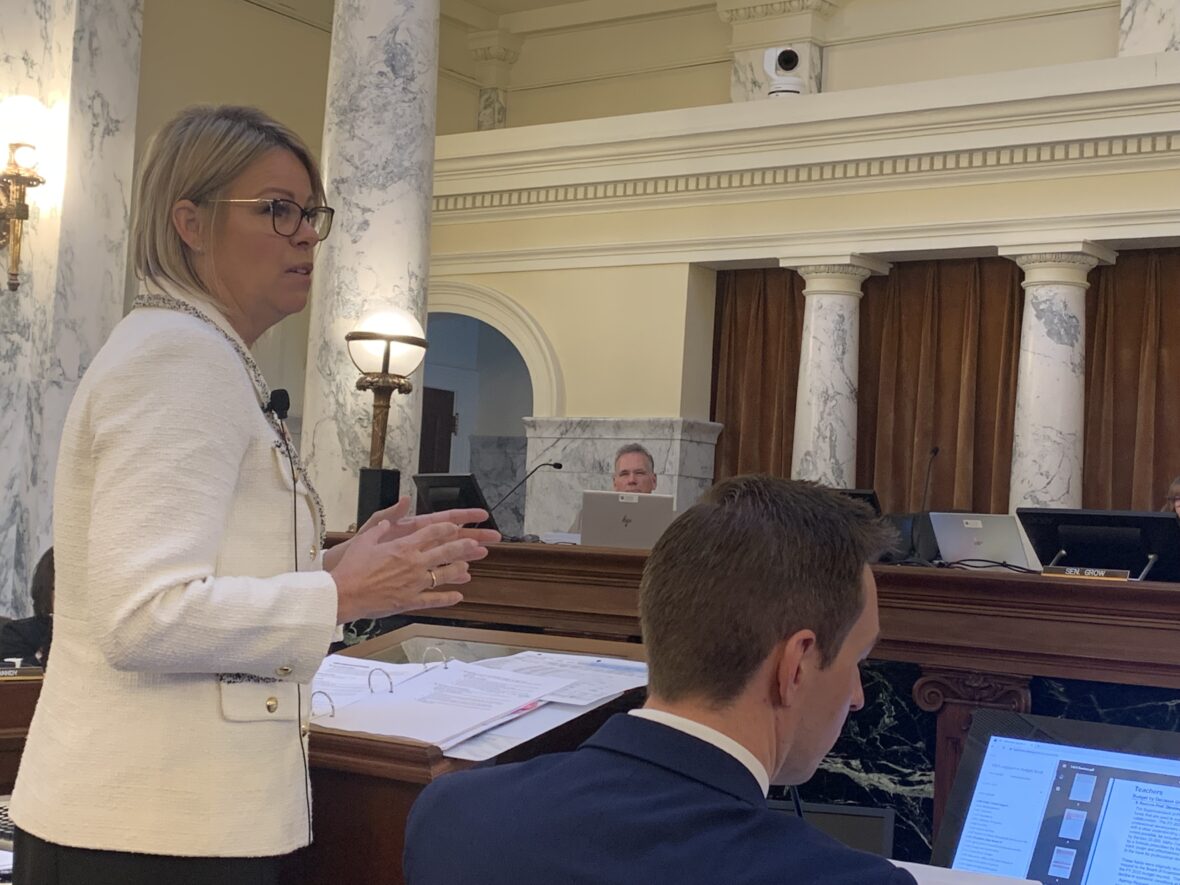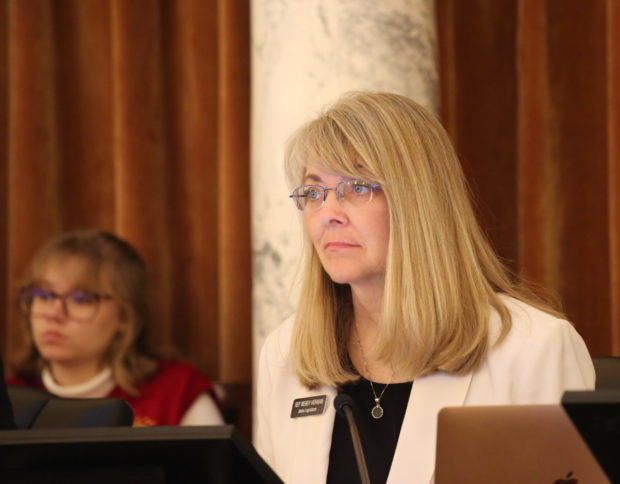State superintendent Debbie Critchfield spelled out a few of her budget priorities Wednesday, deviating slightly from Gov. Brad Little’s blueprint.
On the broad strokes, Critchfield and Little agree on K-12 spending goals. But Critchfield wants several items that didn’t make the cut with Little — such as a boost in career-technical programs; learning materials to help reverse pandemic-related learning loss; money to offset the rising cost of diesel fuel and busing; and mandatory training for local school trustees.

The budget nuances — and the “targeted revisions” Critchfield said she wants — emerged as the newly elected superintendent made her first appearance before the Legislature’s budget-writing Joint Finance-Appropriations Committee. The detailed, often technical discussion spanned more than 90 minutes, and it was JFAC’s first deep dive into a spending plan that could put a record $2.5 billion of general fund tax dollars into the K-12 system.
Critchfield said her budget ideas grew from her election. During her 18-month campaign, Critichfield said she put 55,000 miles on her car, crisscrossing the state and talking with voters.
“You can imagine, I heard a lot,” Critchfield told JFAC members.
But timing also played a big role in shaping the budget request before JFAC Wednesday.
The K-12 budget request, submitted Sept. 1, came from former state superintendent Sherri Ybarra, who Critchfield unseated in a three-person Republican primary. Critchfield was elected on Nov. 8, but took office on Jan. 2 — a week before Little released his budget recommendations, for K-12 and all state agencies.
Critchfield did work in a few new spending wrinkles, which she outlined Wednesday:
- Content and curriculum: $15 million. Local schools would be able to use the money to choose learning materials to address math, literacy or behavioral health.
- Professional development: $9 million. This line item would restore money for teacher training, cut during the pandemic.
- Classroom technology: $10 million. This line item would also address a pandemic-era budget cut. Critchfield said she hopes to head off a budget crash — as laptops and tablets, purchased during the pandemic, reach the end of their lifespan.
- Transportation: $8.2 million. Critchfield wants a 10% increase in this line item, to help schools offset inflation.
- Trustee training: $848,000. The state doesn’t require locally elected trustees to get training; that requirement would need to be addressed in another bill. “I can’t think of a more challenging time, a more critical time, to be a board member,” Critchfield told JFAC.
Critchfield also made a more general pitch for career-technical education. An increased CTE budget would support the needs of rural students, parents and employees, and reduce the need for federal CTE funding, she said. It would also complement Idaho Launch, Little’s proposal to provide high school graduates with up to $8,500 to prepare for in-demand careers.
In many cases, Critchfield and Little are asking for the same things. They both want to continue to increase teacher pay; help schools hire the scarce classified employees who drive buses, serve lunches and help classroom teachers; put more money into classroom computers; and give schools more money to use as they see fit.
In many cases, Little wants to tap into the $330 million in new K-12 money earmarked by lawmakers in September — money that was approved after Ybarra finished her budget request, and money that doesn’t appear in the budget blueprint inherited by Critchfield.
In the weeks to come, it will be up to a bipartisan House-Senate working group to write up six separate K-12 budget bills, which will account for nearly half of the overall state budget. It will be their job to sift through the big-picture requests and the smaller, specific spending line items, and reconcile differences between Critchfield’s request and Little’s recommendation.

“I think both are getting at the same goals, but in a different way,” said Rep. Wendy Horman, R-Idaho Falls, JFAC’s House co-chair.
That process began in earnest today, the third day of JFAC’s “Education Week” series of budget meetings. Over the course of the morning, budget-writers asked questions that could foreshadow the debate ahead.
Questions about Little’s across-the-board pay raise plan, providing more than $6,300 per teacher. Critchfield said she supports it.
Questions about the $405.5 million in COVID-19 relief money available to schools next year. Critchfield promised to offer local schools guidance, and emphasize needs such as CTE and closing achievement gaps. “Our districts have enough hand sanitizer to fill swimming pools.”
And questions about priorities. “We do want to move away from things that do not work,” Critchfield said.
Critchfield said she was relieved to get through her first JFAC presentation, but excited to get the chance to talk to lawmakers about how Idaho could spend additional education dollars.
“Their job is to scrutinize the numbers and to say, ‘Why are you asking for this?’ Part of my job is to instill some confidence and trust that I’m going to be responsible and execute on the things I’ve said,” she said after Wednesday’s hearing.

Two key JFAC members came away impressed.
Sen. Julie VanOrden, R-Pingree, said Critchfield had to walk a balance between her budget and Little’s. “I thought she did a pretty good job of doing that.”
Horman said the new superintendent built on her background. “I think her experience on the State Board prepared her for this experience.”
State Department budget hearing
Critchfield returned to the JFAC podium later Wednesday morning to present the State Department of Education’s budget — a separate request from the public schools budget.
The superintendent told the committee the two requests go hand-in-hand: the SDE budget points toward her priorities for the education system on the whole, and should help turn her promises to action.
Wednesday’s asks include three supplementary items, or additional funding requests for this fiscal year:
- Dyslexia services: $535,000. The SDE would use the funds to promote dyslexia-related professional development, and pay for a state-managed diagnostic tool to identify students with dyslexia, which was mandated by legislation last year. And $115,000 would fund one full-time department employee to take charge of the responsibilities lined out in the dyslexia legislation.
- Transitional costs: $118,900. The money would be used for vacation payouts to former SDE employees.
- Federal grant: $60,400. The federal money would go toward personnel and operating costs for the Stronger Connections Grant, a program designed to provide a safe, drug-free learning environment.
Critchfield also requested funding for six new positions at the State Department (including the dyslexia staffer):
- School choice coordinator: $107,100. After seeing a 126% increase in charter schools across Idaho over the past 18 years, the SDE has only one charter school coordinator. Adding a new employee into the mix would ease the burden on the single employee, and allow the department to better serve families who are pursuing nontraditional educational routes.
- Parental engagement coordinator: $107,100. Along similar lines, Critchfield says a parental engagement staffer would help connect parents to all of their options, instead of telling them to turn to their local school districts.
- Workforce development coordinator: $107,100. Critchfield wants a workforce development staffer at the SDE to help align the department’s mission with the Division of Career Technical Education, and act has a liaison between industries, districts, charters and other stakeholders.
- Early literacy coordinator: $107,100. Critchfield believes the responsibilities laid out for the former early literacy coordinator did not prioritize literacy. This position would be curated more toward Critchfield’s literacy goals, and best practices.
- Senior financial specialist: $83,500. The most recent addition to the SDE finance team came in 2015. Since then, Critchfield said, the workload has increased by the equivalent of one full-time employee. This position would fill that gap, and help the department “protect and honor” taxpayer dollars.
The new positions, Critchfield said, would amount to a net gain of three SDE employees, after the department transfers three IT professionals to the State Board of Education.
She also recommended $230,000 for student assessment development.

One lawmaker was skeptical of the SDE’s need for a school choice coordinator or parental engagement staffer when Idaho has charter agencies designed to help parents sort through their options.
“It seems to me that we’re double-dipping here,” said Rep. Rod Furniss, R-Rigby.
Critchfield said the staffers would coordinate with the charter commission and other organizations, but would fulfill different roles.
Fielding other questions, Critchfield said her team would report back to lawmakers with information about what the responsibilities of a school choice coordinator and parent engagement coordinator might look like, and on the current vacancies at the SDE.
NIC’s uncertain future
A brief conversation about North Idaho College’s tumultuous past and uncertain future ensued in the Senate Education Committee’s Wednesday meeting, as the four state community college presidents — Dean Fisher, College of Southern Idaho; Rick Aman, College of Eastern Idaho; Gordon Jones, College of Western Idaho; and interim president Greg South, North Idaho College — gave lawmakers overviews of the four institutions.
Sen. Carrie Semmelroth, D-Boise, asked South about NIC’s precarious accreditation standing.
“We are fully accredited, we will remain fully accredited,” South responded. He warned against speculating about the college’s accreditation, but acknowledged the severity of the school’s situation. NIC’s five board trustees also sat in the audience.
In December, the Northwest Commission on Colleges and Universities issued a warning letter to NIC leadership, suggesting the college’s governing dysfunction could cost the institution its accreditation. South’s December hire was part of the NIC board of trustees’ plan to get the college back on track.
A loss of accreditation could have a profound effect on NIC and its students. Course credits from NIC would not transfer to other schools, affecting full- and part-time students and high school students taking dual credit classes. Students would also be ineligible for the state’s Opportunity Scholarship.
The Coeur d’Alene based community college serves just over 11,000 students through on-campus services, dual credit and more.
“We would urge you, in all urgency, to solve those issues,” Sen. Dave Lent, R-Idaho Falls told South before adjourning the meeting.
